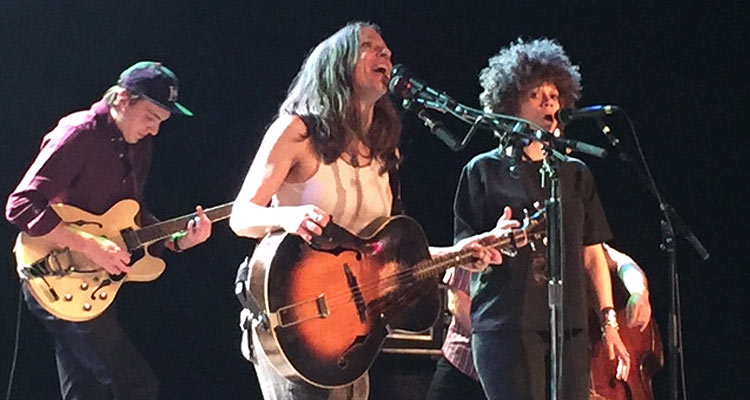Far be it from Ani DiFranco to stay home during an election year. The relentless folk singer released Allergic To Water in 2014, and she’s been touring almost nonstop since…well, since her career began. Other than the occasional Best Recording Package Grammy nomination, the music establishment has virtually ignored DiFranco since the mid ’90s, while she’s continued to write insightful songs and evolve her sound through shades of rock, soul, and especially jazz. Political activism has been a constant in her lyrics, right alongside heartbreaking confessionals, and Friday night’s packed Turner Hall show was a potent collection of pages from the DiFranco personal diary. Even though some of those old songs must seem plucked from a different life, she still manages to convey their emotional weight as if she’d written them yesterday.
Although DiFranco is ostensibly still touring for Allergic, she’s been digging deeply into her back catalog on this current jaunt. She played four songs from her latest, but only two songs from across her previous six albums, as if she’s sold herself as short as the press has. Still, it wasn’t by any means a greatest-hits show, if such a thing is possible; aside from mainstays “Shy,” “Gravel,” and “32 Flavors,” the set list included mostly lesser-known cuts from her ’90s albums, several of which haven’t been in regular rotation since the ’90s.
Perhaps sadly, the social outrage voiced in songs like “Fuel” and “Crime For Crime” is as relevant today as it was 20 years ago, and both of these songs inspired a raucous response from the crowd, thanks in part to the exuberant ensemble playing of bassist Todd Sickafoose and drummer Terence Higgins (of The Dirty Dozen Brass Band), combined with DiFranco’s forceful guitar work. She also played a brand new song called “Nowhere But Barstow And Prison,” which she wrote the music for as part of The Prison Music Project, a forthcoming “album of songs, poems, and raps by nine incarcerated (currently or previously) artists at New Folsom Prison” (according to the project’s website). “We are the most incarcerating nation on Earth,” DiFranco said by way of introduction, “but we can change it.”
At least as moving were DiFranco’s more personal reflections. “Angry Anymore,” one of her few songs about forgiveness and understanding, provided an early dose of optimism. At the opposite end of the spectrum were the mournful rarities “Sorry I Am” and “Grey,” the latter surely one of the most depressing songs ever written, reimagined in the live setting as a virtual anthem compared to the sparse, desolate studio version. DiFranco’s lyrics delve more deeply than most songwriters’ into the psychological darkness of relationships, and this particular performance could have functioned nicely as a group therapy session, even if the specific demons from her past have long since been exorcised.
DiFranco has had a tempestuous relationship with her fanbase at times as well. At the height of her popularity, fans scrutinized and over-analyzed her every move, but the passing years have mellowed the animosity. “Would it be weird to tell you that you make me feel proud?” she asked early in the set, although as the night wore on, a large portion of the crowd seemed determined not to live up to that pride. Most notably, when she pulled out “Sorry I Am,” one of four selections from her 1995 breakthrough Not A Pretty Girl, the crowd was extremely chatty and seemingly disinterested, and DiFranco let the song trail off before it was finished as if in frustration. The fickle acoustics of the ballroom probably didn’t help matters; at times during the quieter songs, it was as if the music was only background noise for Friday night social hour, a far cry from the rapt attentiveness and screams of adulation once commonplace at DiFranco’s shows.
Then again, it may be that many of the issues DiFranco has spent her life shouting about from the fringes have become a part of mainstream American culture now, and the “freakshow” she once presided over is now a relatively content faction of Generation X. Her presentation was much lighter on the proselytizing than usual—even the encore of “¿Which Side Are You On?” felt less like a song of protest than one of celebration. After all, at an Ani DiFranco concert, nearly everybody’s already on the same side, and with our country so politically polarized, a line like “A little socialism don’t scare me one bit” is likely to be eaten up or dismissed without a second thought. DiFranco may be preaching to the choir nowadays, but she deserves a lot of the credit for teaching them to face up and sing in the first place.

